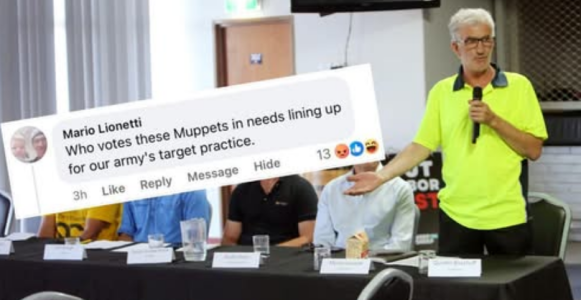You won’t believe what this Albany councillor said about Greens voters—sparks outrage
By
Gian T
- Replies 0
In a story that’s left many questioning, a local councillor has found himself in trouble after making a controversial comment on social media.
The remark, deemed unacceptable by many, has sparked outrage and drawn swift reactions from various community members.
Calls for accountability have quickly followed.
It all began when Mario Lionetti, a sitting councillor for the City of Albany in Western Australia, responded to a social media post profiling Greens candidate Giz Watson, who is running for the federal seat of O’Connor.
Instead of engaging in respectful debate, Mr Lionetti wrote: 'Who votes these muppets in needs lining up for our army’s target practice.'

The comment, which was quickly screenshotted and shared, left many stunned.
While social media can sometimes bring out the worst in people, it’s especially concerning when such language comes from someone elected to represent their community.
Giz Watson herself was quick to call out the comment, saying, 'It’s inappropriate language and behaviour, especially for someone who holds a position in the local council. You would expect a lot more of someone in that position, and inciting violence has no place in our community.'
Albany’s Mayor, Greg Stocks, didn’t mince words either. He described the comments as 'indefensible, unacceptable' and made it clear that they do not reflect the values of the City of Albany.
'This is not good for Albany, it’s not good for the council,' he said. 'I’m really disappointed, and I expect he’ll get a clip around the ear over it.'
Mayor Stocks also indicated that the comments could breach the City of Albany’s code of conduct and that the council is currently determining its next steps.
While the process is confidential, the Mayor felt it was important to denounce the remarks publicly.
It’s one thing for heated debates to happen online, but when elected officials use language that could be seen as inciting violence or disrespecting voters, it undermines trust in our democratic institutions.
Local councils are meant to be the voice of their communities, and councillors are expected to set an example—especially for younger generations.
Many in the community have pointed out that, regardless of political differences, there’s no place for this kind of rhetoric in public life.
As Giz Watson put it, 'Inciting violence has no place in our community.'
It’s a sentiment that resonates with many Australians who value respectful debate and fair representation.
At the time of writing, Mr Lionetti has not responded to requests for comment.
The City of Albany is reviewing the situation, and it’s possible that disciplinary action could be taken if the comments are found to breach the council’s code of conduct.
This isn’t the first time a public figure has landed in hot water over social media comments, and it likely won’t be the last.
But it does serve as a timely reminder that words have consequences—especially when they come from those in positions of power.
Unfortunately, this incident is part of a wider trend of increasingly heated and sometimes toxic political discourse, both online and offline.
While it’s natural to have strong opinions about politics, it’s important to remember that democracy relies on respectful debate and the ability to disagree without resorting to personal attacks or threats.
For many over 60s, this kind of behaviour is particularly disappointing.
After all, we’ve seen decades of political change in Australia, and while there have always been disagreements, there was also a sense of civility and mutual respect that seems to be fading in some quarters.

Have you ever witnessed inappropriate behaviour from your local councillors or politicians? Do you think social media is making things worse, or is it just shining a light on what’s always been there? And most importantly, what do you think should happen when public officials comment like these? Share your thoughts in the comments below.
The remark, deemed unacceptable by many, has sparked outrage and drawn swift reactions from various community members.
Calls for accountability have quickly followed.
It all began when Mario Lionetti, a sitting councillor for the City of Albany in Western Australia, responded to a social media post profiling Greens candidate Giz Watson, who is running for the federal seat of O’Connor.
Instead of engaging in respectful debate, Mr Lionetti wrote: 'Who votes these muppets in needs lining up for our army’s target practice.'

The comment on social media suggested that Greens voters should be used as an army target practice, sparking backlash. Credit: Facebook
While social media can sometimes bring out the worst in people, it’s especially concerning when such language comes from someone elected to represent their community.
Giz Watson herself was quick to call out the comment, saying, 'It’s inappropriate language and behaviour, especially for someone who holds a position in the local council. You would expect a lot more of someone in that position, and inciting violence has no place in our community.'
Albany’s Mayor, Greg Stocks, didn’t mince words either. He described the comments as 'indefensible, unacceptable' and made it clear that they do not reflect the values of the City of Albany.
'This is not good for Albany, it’s not good for the council,' he said. 'I’m really disappointed, and I expect he’ll get a clip around the ear over it.'
Mayor Stocks also indicated that the comments could breach the City of Albany’s code of conduct and that the council is currently determining its next steps.
While the process is confidential, the Mayor felt it was important to denounce the remarks publicly.
It’s one thing for heated debates to happen online, but when elected officials use language that could be seen as inciting violence or disrespecting voters, it undermines trust in our democratic institutions.
Local councils are meant to be the voice of their communities, and councillors are expected to set an example—especially for younger generations.
Many in the community have pointed out that, regardless of political differences, there’s no place for this kind of rhetoric in public life.
As Giz Watson put it, 'Inciting violence has no place in our community.'
It’s a sentiment that resonates with many Australians who value respectful debate and fair representation.
At the time of writing, Mr Lionetti has not responded to requests for comment.
The City of Albany is reviewing the situation, and it’s possible that disciplinary action could be taken if the comments are found to breach the council’s code of conduct.
This isn’t the first time a public figure has landed in hot water over social media comments, and it likely won’t be the last.
Unfortunately, this incident is part of a wider trend of increasingly heated and sometimes toxic political discourse, both online and offline.
While it’s natural to have strong opinions about politics, it’s important to remember that democracy relies on respectful debate and the ability to disagree without resorting to personal attacks or threats.
For many over 60s, this kind of behaviour is particularly disappointing.
After all, we’ve seen decades of political change in Australia, and while there have always been disagreements, there was also a sense of civility and mutual respect that seems to be fading in some quarters.
Key Takeaways
- Albany councillor Mario Lionetti said on social media that Greens voters should be used as army target practice in response to a profile of Greens candidate Giz Watson.
- The comments have been condemned by Albany Mayor Greg Stocks and Giz Watson, who described the remarks as unacceptable and inappropriate for someone in local government.
- Mayor Stocks stated the comments do not reflect the views of the City of Albany, are indefensible and may breach the council’s code of conduct, with next steps yet to be determined.
- Mr Lionetti, who ran as an independent in the state election and runs a stock feed business, did not respond to requests for comment.
Last edited:







